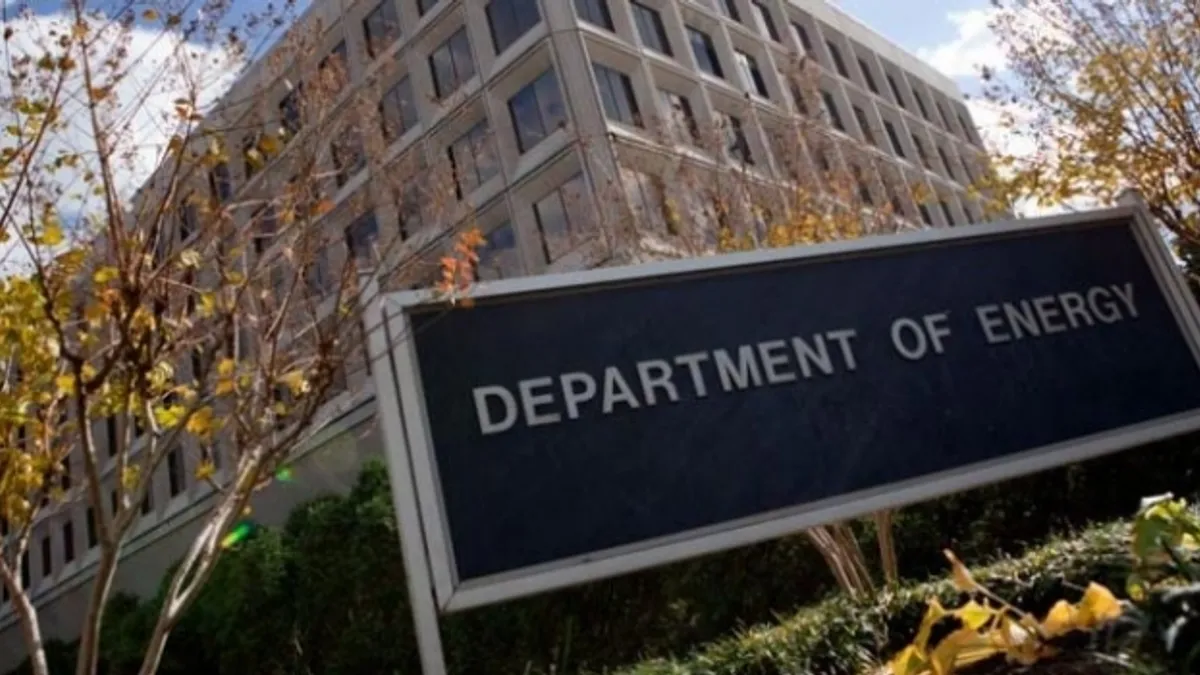Dive Brief:
- The U.S. Department of Energy (DOE) has finalized changes to the "process rule" that conservation experts say will help cut greenhouse gas emissions and save consumers money by undoing hurdles to setting appliance efficiency standards put in place by the Trump administration in 2020.
- The new rule, published Friday, eliminates minimum energy savings thresholds for DOE to set new standards, helps bring stakeholders into a negotiation process to develop standards, and gives the agency discretion in how the process rule is utilized.
- "This removes some of the big roadblocks the previous administration left behind," Andrew deLaski, executive director of the Appliance Standards Awareness Project (ASAP), said in a statement. Appliance and equipment manufacturers, however, say the changes will reduce transparency and certainty.
Dive Insight:
The federal government's Appliance and Equipment Standards Program reviews efficiency requirements every six years, but the agency has fallen behind, mostly under the Trump administration. According to ASAP, a program within the American Council for an Energy-Efficient Economy, by the time President Joe Biden took office DOE had missed 28 deadlines to consider new product standards — and the clock continues to run.
There are 19 additional deadlines coming up before January 2025, says ASAP, meaning Biden's DOE will need to consider updating 47 appliance efficiency standards in total. Reversing rule changes made by the previous administration is a key to getting the agency on track to consider standards in a timely manner, said deLaski.
"Undoing all these hurdles will clear the way for the department to really get moving on updating the standards for dozens of types of appliances and equipment," he said. DOE's appliance program sets efficiency standards for a range of products, from dish washers and refrigerators to furnaces and air conditioners.
DOE published the rule changes Friday and they will go into effect 30 days after appearing in the Federal Register.
The changes will return the process rule to guidance status. DOE said that among the most significant 2020 changes to the process rule was to turn what had been guidance on usual practices for issuing energy conservation standards and test procedures "into binding requirements" that include procedural steps that make the rulemaking process lengthier.
"Consequently, DOE has often been unable to meet its rulemaking deadlines ... implementation of this binding process would make it even more difficult to clear the existing backlog of missed rulemaking deadlines in a timely manner and meet future rulemaking deadlines," the agency said in the final rule.
Manufacturers have opposed rolling back the 2020 changes. In comments filed in May, the North American Association of Food Equipment Manufacturers (NAFEM) warned DOE's "discretion" would not help save energy or advance the standards setting process.
"DOE wants additional insulation from having to follow any rules or impinge on its unbridled discretion by seeking to remove any legal impediment to its actions," NAFEM said in those comments. "Such a lack of accountability and unlimited discretion will not provide economic stability or efficiency."
The group stands by those criticisms, NAFEM Vice President of Regulatory and Technical Affairs Charlie Souhrada told Inside EPA's Climate Extra. Changes in the final rule undermine years of work "to develop a process that held the promise of increasing predictability and overall efficiency for energy-efficiency standards."
The National Electrical Manufacturers Association (NEMA) had also opposed some of DOE's proposed changes to the rule.
"A practice of 'energy-savings-at-all-costs' seemed to be in effect, ignorant of diminishing returns on mature product standards," NEMA said in an April blog post. "Most proponents of energy-savings-at-all-costs bear little to no stake or burden in the development or implementation of those standards."
However, NEMA is "largely satisfied" with the rule DOE put out Friday, officials said in an email.
The group had sought for provisions in the process rule to remain mandatory DOE obligations, but NEMA Director of Regulatory Affairs Alex Boesenberg said the agency "struck an acceptable balance to maintain its internal flexibility."
The group was also "particularly pleased" DOE "upheld our proposals centered around sequencing of Test Procedures and Energy Conservation Standards, such that rulemakings will typically finalize Test Procedures before Standards are proposed," Boesenberg said.
Efficiency advocates on Monday not only cheered the final rule, but called for DOE to make additional changes.
The agency must still finalize a proposal to undo other new requirements from the Trump administration that were not addressed in Friday's rule, according to ACEEE. Those changes include making it easier for DOE to set standards for commercial heating and cooling equipment, and eliminating other procedural steps advocates say are unnecessary.
"Time is of the essence because every extra month it takes to update a standard, inefficient products are sold that hurt the climate and saddle people with needless energy costs," ACEEE Executive Director Steven Nadel said in a statement.















